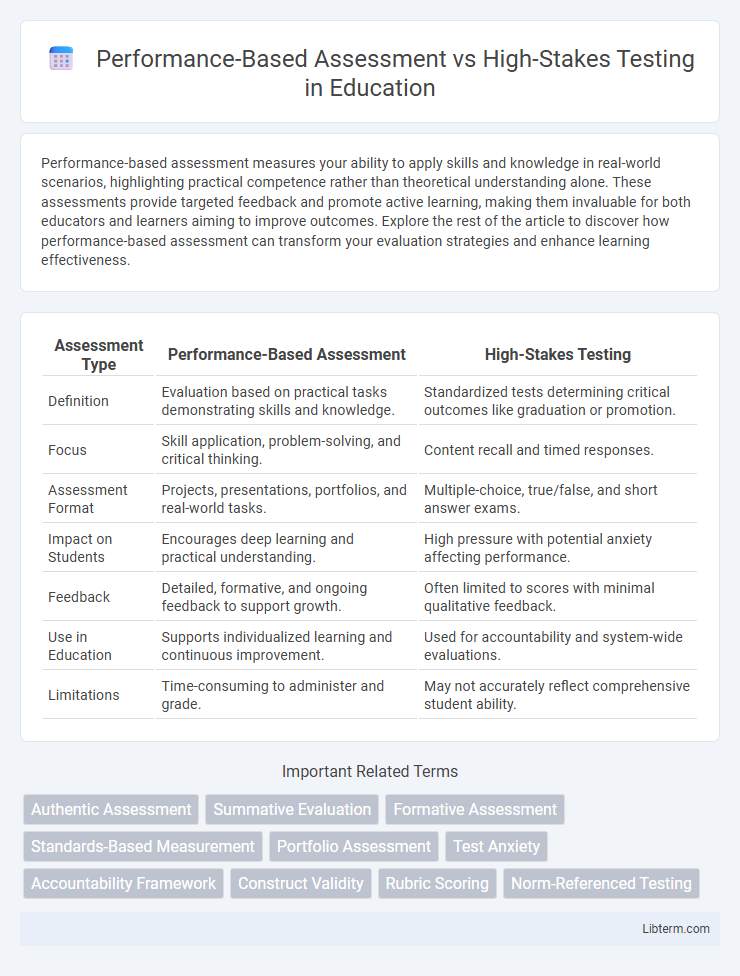Performance-based assessment measures your ability to apply skills and knowledge in real-world scenarios, highlighting practical competence rather than theoretical understanding alone. These assessments provide targeted feedback and promote active learning, making them invaluable for both educators and learners aiming to improve outcomes. Explore the rest of the article to discover how performance-based assessment can transform your evaluation strategies and enhance learning effectiveness.
Table of Comparison
| Assessment Type | Performance-Based Assessment | High-Stakes Testing |
|---|---|---|
| Definition | Evaluation based on practical tasks demonstrating skills and knowledge. | Standardized tests determining critical outcomes like graduation or promotion. |
| Focus | Skill application, problem-solving, and critical thinking. | Content recall and timed responses. |
| Assessment Format | Projects, presentations, portfolios, and real-world tasks. | Multiple-choice, true/false, and short answer exams. |
| Impact on Students | Encourages deep learning and practical understanding. | High pressure with potential anxiety affecting performance. |
| Feedback | Detailed, formative, and ongoing feedback to support growth. | Often limited to scores with minimal qualitative feedback. |
| Use in Education | Supports individualized learning and continuous improvement. | Used for accountability and system-wide evaluations. |
| Limitations | Time-consuming to administer and grade. | May not accurately reflect comprehensive student ability. |
Understanding Performance-Based Assessment
Performance-based assessment evaluates students through practical tasks that reflect real-world applications of knowledge, emphasizing skills such as critical thinking, problem-solving, and creativity. Unlike high-stakes testing, which measures learning through standardized exams with significant consequences, performance-based assessment fosters deeper comprehension and ongoing learning by requiring active demonstration of competencies. Research indicates that this type of assessment better supports diverse learning styles and promotes long-term retention of material.
Defining High-Stakes Testing
High-stakes testing refers to standardized exams that carry significant consequences for students, teachers, or schools, often influencing grades, graduation eligibility, or funding decisions. These tests are designed to evaluate proficiency in core subjects like math, reading, and science under strict conditions to ensure fairness and comparability. Critics argue that high-stakes testing can induce stress and narrow curriculum focus, contrasting with performance-based assessment that emphasizes practical skills and in-depth understanding.
Key Differences Between Assessment Methods
Performance-based assessment evaluates students through real-world tasks that demonstrate practical skills and knowledge application, while high-stakes testing relies on standardized exams that measure cognitive recall and benchmark proficiency. Performance-based methods provide formative insights fostering critical thinking and problem-solving, contrasting with high-stakes tests that often determine significant academic or professional outcomes based on a single test event. The key differences include the assessment format, focus on skill application versus content memorization, and the impact on student motivation and instructional approaches.
Impact on Student Learning and Development
Performance-based assessment enhances student learning by fostering critical thinking, creativity, and real-world problem-solving skills through hands-on tasks and projects. High-stakes testing often narrows the curriculum and increases stress, which can hinder deep understanding and long-term retention of knowledge. Emphasizing performance-based methods supports holistic development, including collaboration, communication, and self-regulation, essential for lifelong success.
Teacher Perspectives and Roles
Teachers often view performance-based assessments as more reflective of student understanding and skills, allowing for tailored feedback and instructional adjustments. In contrast, high-stakes testing can narrow teaching to test preparation, limiting creative pedagogy and increasing pressure on both educators and students. Educators play a crucial role in designing performance tasks that align with learning goals, fostering deeper engagement compared to the standardized nature of high-stakes exams.
Measuring Critical Thinking and Creativity
Performance-based assessment evaluates critical thinking and creativity by requiring students to apply knowledge through real-world tasks, fostering deeper understanding and innovation. High-stakes testing primarily measures rote memorization and standardized knowledge recall, limiting the ability to assess complex problem-solving and original thought. Consequently, performance-based methods provide a more comprehensive insight into students' analytical skills and creative potential.
Equity and Accessibility Concerns
Performance-based assessment offers greater equity and accessibility by accommodating diverse learning styles and providing multiple ways for students to demonstrate knowledge, reducing bias inherent in high-stakes testing. High-stakes tests often exacerbate educational inequities by relying on standardized formats that disadvantage students with disabilities, language barriers, or limited resources. Emphasizing authentic tasks in performance assessments promotes inclusivity and a fairer evaluation of student abilities across varied backgrounds.
Accountability in Education Systems
Performance-based assessment emphasizes authentic evaluation of student skills and comprehension through projects, presentations, and portfolios, providing detailed insights into learning progress. High-stakes testing centers on standardized exams that often dictate student promotion, graduation, or school funding, creating pressure to meet specific accountability benchmarks. Education systems integrating performance-based assessment tend to foster deeper learning and continuous improvement, whereas reliance on high-stakes testing may narrow curriculum focus and encourage teaching to the test.
Long-Term Outcomes for Students
Performance-based assessment emphasizes authentic tasks that develop critical thinking and problem-solving skills, promoting deeper learning and long-term retention. High-stakes testing often prioritizes short-term memorization and specific content recall, which may not translate into sustained academic or career success. Research indicates that students engaged in performance-based assessments show improved motivation, adaptability, and preparedness for real-world challenges, enhancing lifelong educational outcomes.
Future Trends in Assessment Practices
Performance-based assessment emphasizes real-world skills and critical thinking, aligning with future trends that prioritize personalized, competency-based learning. High-stakes testing faces growing criticism for its limited scope and stress-induced impacts, prompting shifts towards more holistic evaluation methods incorporating technology and adaptive testing. Emerging assessment practices leverage AI-driven analytics and portfolio assessments to offer continuous, formative feedback, fostering deeper learning and skill mastery.
Performance-Based Assessment Infographic

 libterm.com
libterm.com